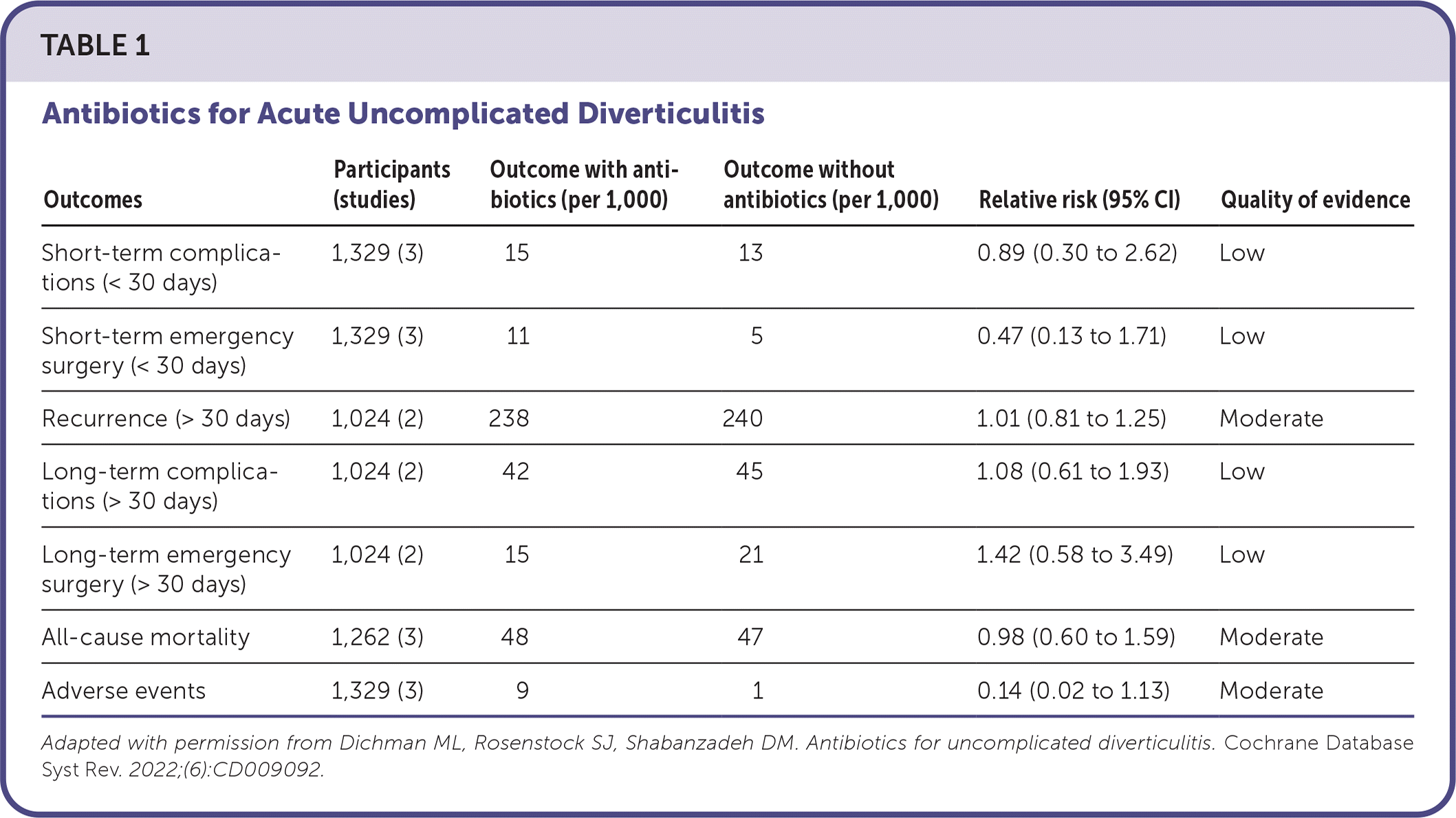
Am Fam Physician. 2023;108(3):237-238
Author disclosure: No relevant financial relationships.
Clinical Question
Does antibiotic therapy for acute uncomplicated diverticulitis reduce complications or the need for emergency surgery?
Evidence-Based Answer
Antibiotics do not reduce complications or the need for emergency surgery in people with acute uncomplicated diverticulitis. Treatment without antibiotics appears to be safe.1 (Strength of Recommendation: B, meta-analysis of lower-quality randomized controlled trials [RCTs].)
Practice Pointers
Acute uncomplicated diverticulitis occurs in approximately 4% of people with colonic diverticulosis and has traditionally been considered a bacterial infection that should be treated with antibiotics.2 Risk factors for diverticulitis (e.g., smoking, obesity, red meat consumption) suggest that chronic inflammation is a potential etiology, which has led some clinicians to question the utility of antibiotics.3 The authors of this Cochrane review sought to determine if antibiotic treatment of acute uncomplicated diverticulitis reduces complications or the need for emergency surgery.
The Cochrane review included three RCTs (1,329 patients) comparing antibiotics and no antibiotics. The authors included studies in which left-sided acute uncomplicated diverticulitis was confirmed by radiography and excluded complicated diseases (e.g., abscess, fistula, stricture, peritonitis, sepsis). Primary outcomes were complications and emergency surgery within 30 days. Secondary outcomes were recurrence, late complications, or surgery after 30 days; adverse events; and all-cause mortality.

| Outcomes | Participants (studies) | Outcome with antibiotics (per 1,000) | Outcome without antibiotics (per 1,000) | Relative risk (95% CI) | Quality of evidence |
|---|---|---|---|---|---|
| Short-term complications (< 30 days) | 1,329 (3) | 15 | 13 | 0.89 (0.30 to 2.62) | Low |
| Short-term emergency surgery (< 30 days) | 1,329 (3) | 11 | 5 | 0.47 (0.13 to 1.71) | Low |
| Recurrence (> 30 days) | 1,024 (2) | 238 | 240 | 1.01 (0.81 to 1.25) | Moderate |
| Long-term complications (> 30 days) | 1,024 (2) | 42 | 45 | 1.08 (0.61 to 1.93) | Low |
| Long-term emergency surgery (> 30 days) | 1,024 (2) | 15 | 21 | 1.42 (0.58 to 3.49) | Low |
| All-cause mortality | 1,262 (3) | 48 | 47 | 0.98 (0.60 to 1.59) | Moderate |
| Adverse events | 1,329 (3) | 9 | 1 | 0.14 (0.02 to 1.13) | Moderate |
The quality of evidence for the primary outcomes was low due to a lack of blinding in two of the three studies, leading to a risk of detection and performance bias. The body of evidence is limited because only three RCTs are included in this review. However, a recently published non-inferiority, triple-blinded RCT (480 patients) not included in this review demonstrated that not using antibiotics for outpatient treatment of acute uncomplicated diverticulitis is safe and not inferior to antibiotic therapy.4 The American Gastroenterological Association suggests selective use of antibiotics in acute uncomplicated diverticulitis with patients who are immunocompromised, pregnant, or critically ill, representing a shift toward management without antibiotics.5 The use of antibiotics to treat acute uncomplicated diverticulitis can cause serious adverse events, including allergic reactions and Clostridioides difficile infections. Antibiotic treatment should be carefully considered because of growing global concerns about antimicrobial resistance. Management of acute uncomplicated diverticulitis without antibiotics appears to be safe.
The practice recommendations in this activity are available at https://www.cochrane.org/CD009092.
